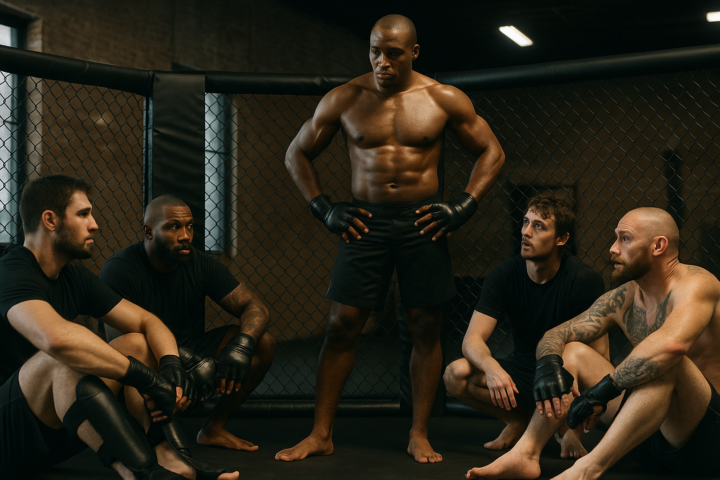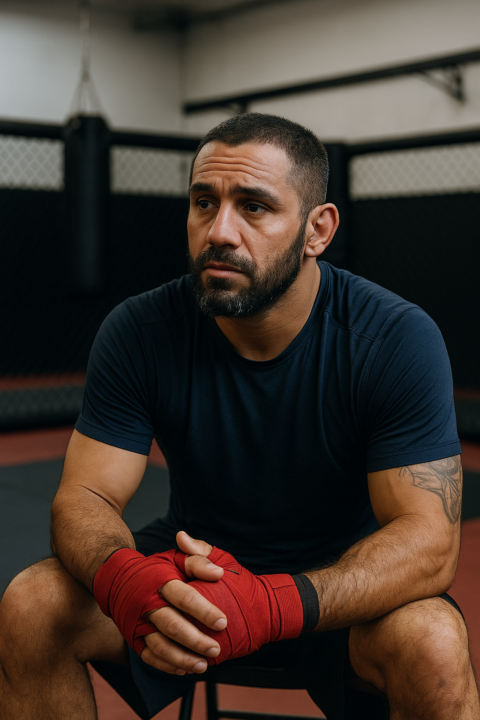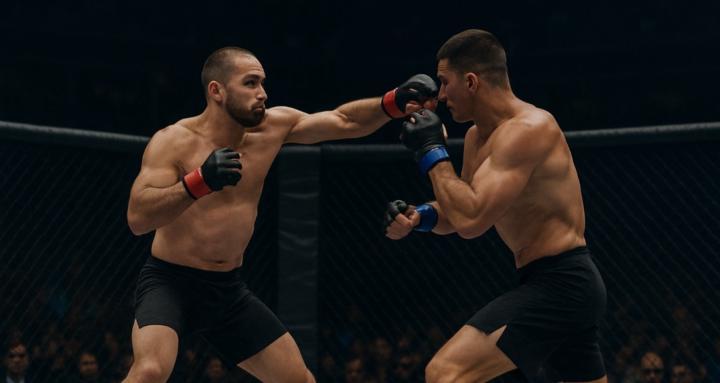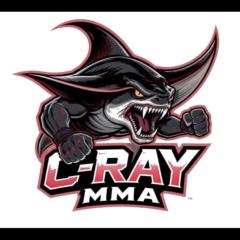
Write something
OUR VISION
Welcome to the club! Our vision is clear: to master addiction, build a yielding resolve and fight life battles daily, inside the cage or out. 💪 Here, you will find a relentless pursuit to stay sober and rise stronger than yesterday. The path may not be easy, but together we will stand against the darkness. And together, we will stay sober for TODAY, TOMORROW AND ALWAYS ONE MORE DAY.
0
0
🧠 “Tomorrow Might Not Come”: Mark Coleman’s Sobriety Message to the Fight World
MMA legend Mark “The Hammer” Coleman has faced and conquered some of the most dangerous men in the Octagon. But his most meaningful victory didn’t come with his hands raised after a fight — it came through his battle with alcoholism and the daily decision to live sober. In a recent emotional interview, Coleman opened up about his struggles with addiction, his near-death experiences, and what finally pushed him to make a permanent change. His story isn't just powerful — it’s a wake-up call to fighters and fans alike. 💥 Fighting the Wrong Opponent After retirement, Coleman admitted that he lost direction. The structure and discipline that once defined his training were gone, replaced by binge drinking, pain, and denial. He described how his drinking spiraled into self-destruction — physically, mentally, and spiritually. “I was lying to myself for years,” Coleman shared. “Telling myself I was still in control. But the truth was, I wasn’t.” Eventually, his body began to break down. Hospital visits became more frequent, and health issues mounted. His daughters staged an intervention, begging him to get help. That moment changed everything. 🚨 The Turning Point: "Tomorrow Might Not Come" Mark Coleman credits his family — especially his daughters — for saving his life. One of the hardest-hitting statements he made was this: “Tomorrow might not come. I kept thinking I’d quit someday. But someday almost never came.” With their support, he entered rehab and began the long road to recovery. For the first time in years, he faced life without alcohol — raw, painful, and real. But also with clarity, purpose, and strength he hadn’t felt in years. 🥊 A Fighter’s Mindset in Recovery Coleman leaned on the same grit and discipline he had in the cage to stay sober. He’s now over three years sober, and he uses his story to inspire others — especially young fighters — to rethink their relationship with alcohol and drugs. He’s proof that recovery isn’t weakness — it’s warrior-level courage. It's not about pretending to be perfect. It's about showing up, being vulnerable, and staying in the fight.
0
0

Fighting the Ultimate Opponent: Addiction — 5 MMA Fighters Who Turned Their Lives Around
In the cage, MMA fighters face dangerous opponents with precision and power. But for some, their most brutal fight isn’t under the lights — it’s the daily war against addiction. The stories of these five fighters show what true grit looks like — not just inside the Octagon, but in life. 💥 1. Mark Kerr – From Champion to Rock Bottom and Back Known as “The Smashing Machine,” Mark Kerr was once one of the most dominant fighters in the sport. But behind the wins was a dependency on painkillers and narcotics that spiraled into addiction. Kerr’s story was even featured in an HBO documentary, showing the harsh reality of drug use behind closed doors. After years of struggle, Mark made the choice to confront his demons and walk the long road to sobriety. Lesson: Even the most dominant athletes can struggle. What matters is finding the strength to rise again. 🧠 2. Matt Brown – Saved by the Fight Before becoming a UFC staple, Matt Brown lived a reckless life of substance abuse that nearly killed him. His nickname “The Immortal” comes from a real brush with death due to a heroin overdose. He credits MMA with giving him a reason to live — something to fight for. The discipline, structure, and purpose of fighting helped him leave addiction behind. Lesson: Sometimes, all it takes is finding something worth fighting for. ⚡ 3. Anthony Johnson – Rebuilding After Personal Struggles The late Anthony “Rumble” Johnson was known for his knockout power. While his addiction struggles weren’t as public, he was open about the internal battles he faced and how turning inward and focusing on wellness helped him get his life back on track before his passing in 2022. Lesson: Recovery isn’t always public — but the internal victories matter most. 🩸 4. Ian McCall – From Chaos to Clarity Ian “Uncle Creepy” McCall was once the top flyweight in the world. Behind the fame, though, was a deep battle with substance abuse — from pills to harder drugs. He’s been candid about hitting rock bottom, including time in jail. But Ian used that experience to fuel a new mission: becoming a speaker and advocate for plant-based medicine and mental health.
0
0

🥋 From Rock Bottom to Redemption: How MMA Helped One Fighter Overcome Addiction
In the world of Mixed Martial Arts, grit, discipline, and endurance are core values. But for many fighters, the biggest battles are fought outside the cage. For pro MMA fighter Andrew Montañez, his most brutal opponent wasn’t another fighter — it was addiction. Growing up in New Jersey, Andrew was surrounded by good influences: family, sports, and a solid work ethic. But as he entered adulthood, stress and emotional strain led him down a dangerous path. What started as recreational drinking turned into a full-blown alcohol addiction that disrupted every area of his life. He began making excuses to drink and lost sight of who he was. His rock bottom didn’t come during a fight — it came in the form of losing friends, relationships, and most importantly, himself. “I realized I was slowly dying,” Andrew said. But what saved him wasn’t just willpower. It was faith, support, and a renewed purpose — much of which he found through MMA. 🧠 Choosing Sobriety: A Fight Worth Training For Andrew didn’t just “quit drinking.” He transformed his entire lifestyle. With the help of supportive friends and the recovery community, he embraced a structured life centered around training, coaching, and spiritual growth. Faith played a major role in his healing process — giving him strength during moments of weakness. What made MMA so effective in his journey? According to Andrew, it’s the discipline, repetition, and focus it requires. Fighting isn’t just physical — it’s deeply mental. The same mindset needed to go five rounds in the cage is the same mindset needed to stay sober one day at a time. Instead of focusing on what he was giving up, he focused on what he was gaining — clarity, purpose, connection, and health. 🥊 Building a New Legacy Today, Andrew Montañez is not only a coach and fighter — he’s a role model for recovery. He uses his platform to speak openly about addiction and mental health in the fight world. He teaches young athletes not only how to throw punches, but how to build character, face adversity, and stay true to their values.
0
0

Toughest Injury You’ve Pushed Through
Call to Action:Every fighter has a war story. What injury tested your grit the most? How did you bounce back? Let’s hear the battle scars.
0
0
1-7 of 7

skool.com/mma
C Ray MMA is about forging sobriety through friends, fitness & MMA. Join us to build strength, conquer addiction, and live with purpose! #onemoreday
Powered by
